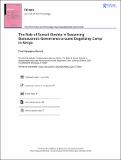| dc.contributor.author | Fred Nyongesa Ikanda | |
| dc.date.accessioned | 2020-08-25T09:50:31Z | |
| dc.date.available | 2020-08-25T09:50:31Z | |
| dc.date.issued | 2020-06-10 | |
| dc.identifier.uri | https://repository.maseno.ac.ke/handle/123456789/2359 | |
| dc.description.abstract | Bureaucracy is often portrayed as having an unrivalled capacity to shape human relationships in states and organisations. By contrast, however, ethnographic studies have suggested that bureaucracy cannot easily take root among Somalis and other Muslim nomadic societies where kinship is ostensibly supreme. Based on ethnographic research at Dagahaley refugee camp, this article challenges the idea that Somali kinship and bureaucratic structures are rival governing technologies. I demonstrate that kinship and bureaucracy play similar roles and are, therefore, not incompatible. Kinship provided traction to bureaucratic procedures in the way people used it alongside bureaucracy as means of governance and resource access. The article contributes to legal and political anthropology, as well as the burgeoning field of ethnography of bureaucracy by attributing common portrayals of civil wars, ethnicity … | en_US |
| dc.publisher | Routledge | en_US |
| dc.subject | Humanitarianism, bureaucracy, Dadaab, kinship, Somali | en_US |
| dc.title | The Role of Somali Kinship in Sustaining Bureaucratic Governance around Dagahaley Camp in Kenya | en_US |
| dc.type | Article | en_US |

